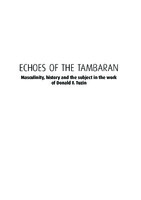Echoes of the Tambaran
Masculinity, history and the subject in the work of Donald F. Tuzin
Author(s)
Lipset, David
Roscoe, Paul
Language
EnglishAbstract
In the Sepik Basin of Papua New Guinea, ritual culture was dominated by the Tambaran —a male tutelary spirit that acted as a social and intellectual guardian or patron to those under its aegis as they made their way through life. To Melanesian scholarship, the cultural and psychological anthropologist, Donald F. Tuzin, was something of a Tambaran, a figure whose brilliant and fine-grained ethnographic project in the Arapesh village of Ilahita was immensely influential within and beyond New Guinea anthropology. Tuzin died in 2007, at the age of 61. In his memory, the editors of this collection commissioned a set of original and thought provoking essays from eminent and accomplished anthropologists who knew and were influenced by his work. They are echoes of the Tambaran. The anthology begins with a biographical sketch of Tuzin’s life and scholarship. It is divided into four sections, each of which focuses loosely around one of his preoccupations. The first concerns warfare history, the male cult and changing masculinity, all in Melanesia. The second addresses the relationship between actor and structure. Here, the ethnographic focus momentarily shifts to the Caribbean before turning back to Papua New Guinea in essays that examine uncanny phenomena, narratives about childhood and messianic promises. The third part goes on to offer comparative and psychoanalytic perspectives on the subject in Fiji, Bali, the Amazon as well as Melanesia. Appropriately, the last section concludes with essays on Tuzin’s fieldwork style and his distinctive authorial voice.
Keywords
papua new guinea; essays; ethnology; Abelam language; Anthropology; EthnographyDOI
10.26530/OAPEN_459090OCN
756714932Publisher
ANU PressPublisher website
https://press.anu.edu.au/Publication date and place
Canberra, 2011Classification
Ethnic studies


 Download
Download Web Shop
Web Shop